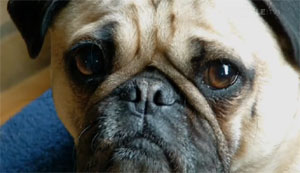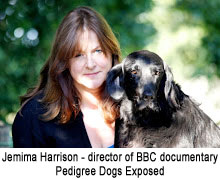5th Anniversary of 'Pedigree Dogs Exposed' - Progress Report
 Today is the 5th anniversary of the BBC documentary 'Pedigree Dogs Exposed' which highlighted the shocking levels of suffering many pedigree dogs endure as a result of the way they are bred.
Today is the 5th anniversary of the BBC documentary 'Pedigree Dogs Exposed' which highlighted the shocking levels of suffering many pedigree dogs endure as a result of the way they are bred.
Programme maker Jemima Harrison, who produced and directed 'Pedigree Dogs Exposed', has backed the RSPCA's call for urgent action. She said: "Five years on from Pedigree Dogs Exposed, the Kennel Club is still in denial about the extent of the problems. It is unethical to continue to breed dogs like Pugs and Bulldogs which have such flat faces that they cannot breathe - and yet the Kennel Club registers these breeds in their growing thousands and these dogs continue to be celebrated at Kennel Club shows.
"The Kennel Club has done very little to tackle the suffering these dogs endure, despite an increasing amount of science which both articulates the issues and offers solutions. The dogs continue to pay a huge price."
The RSPCA have acknowledged the progress made by the Kennel Club and dog breeders, including the development of DNA and health screening tests for hereditary diseases and the introduction of veterinary checks on ‘high profile’ breeds. However, it believes much more should have been done in the five years since Pedigree Dogs Exposed was first broadcast in 2008.
RSPCA chief vet James Yeates said: "Although some progress has been made by the dog world to address the issues raised in ‘Pedigree Dogs Exposed’, it has not been nearly enough. Five years on the problems are still far from being solved.
"We are concerned that many pedigree dogs are still suffering because they’re bred and judged primarily for how they look rather than with health, welfare and temperament in mind.
"We believe that meaningful action is urgently needed in order to make a real improvement to the welfare of pedigree dogs." The RSPCA are calling on people who agree that the health and welfare of dogs should be prioritised over their looks to sign the petition calling for a change to the Kennel Club’s breed standards. For more information and to sign the e-petition, please see Born to Suffer Campaign.
The RSPCA are calling on people who agree that the health and welfare of dogs should be prioritised over their looks to sign the petition calling for a change to the Kennel Club’s breed standards. For more information and to sign the e-petition, please see Born to Suffer Campaign.
The RSPCA have produced a 'progress report' highlighting the areas where urgent action is still needed from The Kennel Club and dog breeding world to improve the health and welfare of pedigree dogs.
Pedigree Dog Breeding Progress Report by the RSPCA
Background
This year its five years since the BBC One documentary Pedigree Dogs Exposed investigated some of the serious health and welfare issues experienced by many pedigree dogs as a result of the way they are bred. Although some progress has been made by the dog world to address these issues, the RSPCA feel it has not been nearly enough and they are concerned that many pedigree dogs are still suffering because they are bred and judged primarily for how they look rather than with health, welfare and temperament in mind.
The RSPCA and other welfare and veterinary organisations consider that there is still much to be done to protect the future health of dogs, as recognised by the recent EFRA report on dog breeding and welfare which said that too many dogs continue to suffer ill-health due to inbreeding and breeding for exaggerated characteristics.
Three major reports were published on dog breeding in the UK in the 18 months following Pedigree Dogs Exposed. All three reports concluded that the welfare issues associated with pedigree dog breeding are very serious, and included a series of recommendations for possible ways forward.
Many of the recommendations are solely within the Kennel Club’s control, and have not been acted upon. The RSPCA believe that meaningful action is urgently needed in order to make a real improvement to the welfare of pedigree dogs.
Below are some of the actions that have been taken for pedigree dog welfare, and just a few examples of the recommendations that are outstanding. As reported by the RSPCA:
What has been done so far?
- Development of a puppy sales contract. The concept of a puppy sales contract was identified as a key action to improve dog welfare. We have therefore worked with the Animal Welfare Foundation (AWF) to develop documentation that will empower puppy buyers to make properly informed decisions when buying a puppy and help them avoid the problems that can arise from buying a puppy from an irresponsible breeder. For breeders and sellers the contract is a record of the thought and attention they have devoted to their puppies' breeding and care.
- Systematic collection of data on inherited diseases. We are working with the Royal Veterinary College and the University of Sydney on a three-year PhD research project to estimate the prevalence of inherited and acquired disorders in both dogs and cats to highlight breeds at greatest risk of specific conditions.
- Formulation of an independent panel of experts. The urgent need for an independent Advisory Council to provide advice on the welfare issues associated with dog breeding was identified by all three reports. We worked with other organisations to take this forward and the Advisory Council on the Welfare Issues of Dog Breeding was established in 2010.
- Revision of Kennel Club registration rules to not register puppies from a bitch that has previously had 2 caesarean sections. Some breeds and some individual mothers struggle to give birth naturally and may end up needing a caesarean every time. This change was welcomed as a step in the right direction, but the RSPCA and veterinary organisations are disappointed that it does not go further to decrease potential distress and suffering to both mother and offspring by stopping the registration of puppies from a bitch that has undergone one caesarean operation, with no exceptions.
- Continued development of DNA and health screening tests for hereditary diseases. Many breeds of dog are prone to a number of inherited disorders. Several health screening tests are available to measure the risk that a dog will be affected by the disease, be a carrier (and able to pass it on to their offspring) or be unaffected. These help breeders to make informed decisions when choosing which dogs to breed from.
- Development of Mate Select. The Kennel Club, in conjunction with the Animal Health Trust, set up Mate Select, an online tool to assist breeders in assessing the impact that their proposed mating will have on genetic diversity within breed populations. They can also check the results of any health screening tests that have been carried out and recorded on the database. However, there is no requirement for breeders to use the tool.
- Introduction of veterinary checks on “high profile” breeds. This was acknowledged as a positive first step to improving the health of pedigree dogs, but we are concerned that it does not go far enough. For example, the rule only applies to 14 ‘high profile’ breeds, but a recent scientific study showed that all of the 50 most popular breeds have some aspect of their body which can cause suffering.
"Whilst some of the recommendations identified in the reports have been taken forward, the problems are far from being solved and there is still a lot more that needs to be done" say the RSPCA.
Below are just a few examples of some of the recommendations that the RSPCA believe have not been acted upon.
- Independent review of the Kennel Club breed standards. Many breed standards include exaggerated physical features, some of which have become so extreme that they can cause pain and suffering, some make dogs prone to particular disorders, and some prevent them from behaving normally. We would like to see the breed standards reviewed by a panel of independent experts, so that they prioritise the health, welfare and temperament of the dogs over their looks.
- Dogs shows like Crufts to judge dogs on their health, welfare and behaviour, rather than their appearance. We would like to see dog shows including all dogs, whether crossbreed, pure-breed or pedigree, and for them to be judged on behaviour, temperament and welfare so that only the happiest, healthiest dogs are awarded.
- Revision of registration rules to put a limit on the number of offspring that can be fathered by any one sire. Using the same dog for many matings increases the level of inbreeding and the risk of inherited disease.
- Revision of registration rules to prevent the registration of offspring from matings between second degree relatives e.g. grandparent-grandchild or aunt/uncle-nephew/niece matings. This would lead to a reduction in the rate of inbreeding and would make a statement about the importance of genetic diversity.
- Only registering puppies from parents that have been properly and fully health screened.
- Ban on registration of dogs born from dam’s second caesarian. To further decrease potential distress and suffering to both mother and offspring.
- Development of secondary legislation to control dog breeding. There are opportunities under the Animal Welfare Act to update and improve the legislation concerning dog breeding. The Welsh Government is in quite an advanced stage of developing such legislation and is due to consult and bring forth revised Regulations in the autumn of this year with the expectation of them becoming law soon after. We would like to see Defra also act and introduce the improvements in legislation we believe necessary to improve welfare conditions.
- Veterinary checks at shows to be carried out by independent vets. We would also like to see a full clinical examination on all dogs that win any class/breed and to make the findings public.
- Open stud books to allow more frequent introduction of new genetic material into established breeds in order to increase genetic pools. To help increase genetic diversity and reduce the risk of inherited diseases.

This trade must be tightened up to save the devastating suffering to innocent animals.
Lets stop this 'Playing God' stuf! No wonder we have to make new rules. We have brought this al on ourselves Ask yourself this: would you change a humans physical appearance? The answer is no! So why do we do this to another sentient species.? Who do we think we are?
Where can I buy this documentary and the follow up Pedigree Dogs Exposed 3 years on? I am from Australia
As it was a BBC documentary, maybe try contacting them.